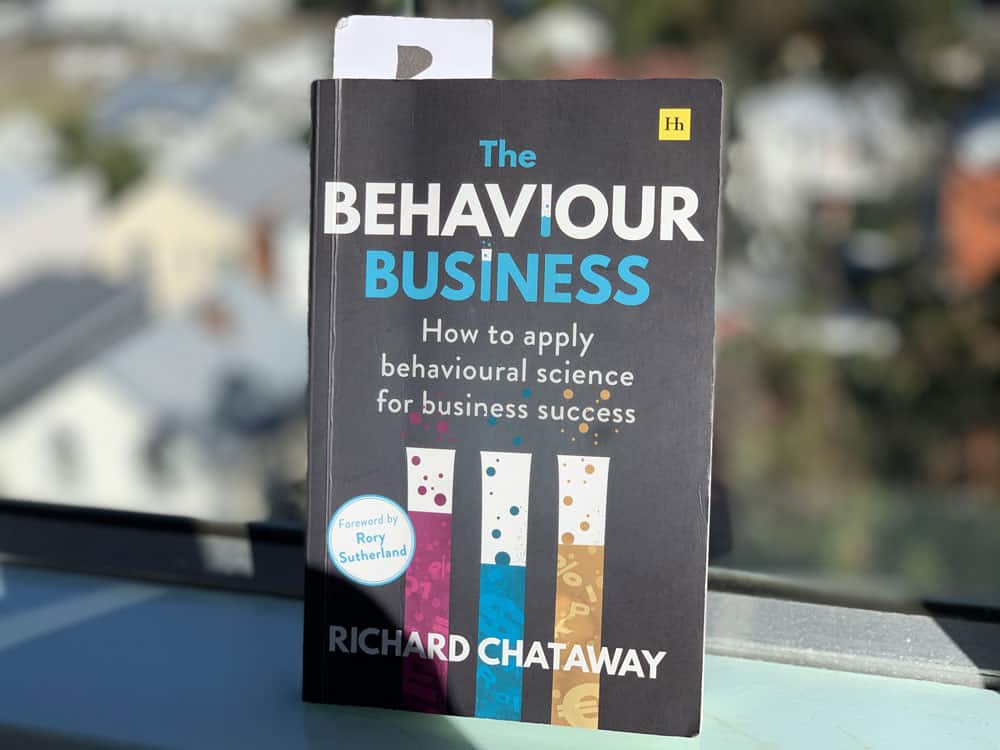In recent years, several notoriously famous incidents of the use of technology to influence peoples’ behaviour without their consent have come to the world’s attention. Whether we are speaking of misuse of social media users’ data or of using AI to make recruitment decisions, it poses an ethical dilemma. History is being written every day, and we don’t know what we don’t know before these incidents—and their ethical consequences—happen. However, businesses are bound to explore new technology to influence customer behaviour – therefore, because the world is driven by technology and it’s moving so quickly, the ethics often can’t keep up.
Richard Chataway’s book The Behaviour Business discusses how we might address this issue. Chataway introduces behavioural science insights to businesses with a special focus on the consideration of ethics and well-meaning intentions. He talks about his own experience, as a behavioural science practitioner, of consulting on the development of an app to help Australian citizens quit smoking as part of an Australian government campaign. Throughout the book, Chataway returns to such examples of the notion of nudging for good, or how we can use technology to change people’s behaviour in a way that will benefit them.

At Umbrella, we use technology to gather data, but we do it in a way that ensures the safety and confidentiality of participants. And we know data isn’t everything. We believe great strategies are based both on data and people insights. Getting comprehensive and reliable data is key to ensuring that our customers’ wellbeing strategy improves outcomes for their people and business, and participants’ insights are key to refining this process.
Chataway also focuses on the practical application of behaviour science in business, drawing on his own professional experience, as well as the experience of the FANG group (Facebook, Amazon, Netflix, Google), government initiatives in the UK and Australia, and other organisations and academic research that have addressed different behaviour challenges.
He guides us through hidden influences of behaviour, explaining what underpins human decision-making: emotions, thinking patterns, unconscious bias and social proof, and illustrates how to ethically use these insights. Chataway reminds the reader again and again: “Much of human decision-making is more emotional, less rational, and more instinctive than we assume”. Through the book, he takes the reader on a journey of “why” and “how-to” apply psychological principles, although he doesn’t often use the word “psychology”. What he does though is invite the reader to think more deeply.
One of the key messages Chataway impresses upon the reader is that business leaders should be encouraged to apply test-tube behaviour. He wants businesses to adopt an approach of continuous testing and learning, similar to what is more commonly used in science: first form a hypothesis, then experiment, then adapt and learn from the outcomes. However, he says, to do so requires applying a growth mindset culture in the business – one that recognises that we can learn as much from failure as from success.
This idea of learning from mistakes resonated with me a lot, and it’s something we regularly discuss at Umbrella. When there is support from leaders in a workplace and an environment where it’s OK to make mistakes, research shows that people tend to be more engaged in the work they’re doing. This contributes to building psychological safety at work.
So, what does a good workplace look like? In the second part of the book, Chataway explores this very question, and talks about flexibility, meaning, autonomy, fairness, support, diversity, collaboration, and role-modelling in the workplace as key concepts. Overall, he highlights the importance of wellbeing at work, and how to create psychological safety nets, using insights from behaviour science.
Developing a new behaviour is essentially forming a new habit. Understanding drivers for your own behaviour increases the chances of sticking to what matters to you, even though it might be difficult at the beginning. Organisations can support people in changing their behaviour at work and help improve their wellbeing and performance. Proactive wellbeing strategies are known to deliver an average ROI of 5:11 for businesses through retaining top talent, increasing productivity, lifting individual performances, and supporting people to live happy, healthy, and fulfilling lives.
At Umbrella’s workshops, we help people strengthen resilience skills and emphasise the importance of regular actions that help us deal with everyday challenges to recover from stressful events quicker and stronger. As Chataway says, “Small changes can have surprisingly large effects”.
This book stayed with me for over a year. It has helped me to navigate through making better business decisions, but it has also impacted on my own personal growth. I took time to digest and apply the ideas throughout, referring back to some of the chapters, highlighting line after line, and checking out the references. If you have enjoyed reading this review, consider finding your own copy of the book.
More about applying behavioural insights in the New Zealand public sector can also be found on the website of the Department of the Prime Minister and Cabinet. Hmmm, I wonder what are they nudging us to do?



